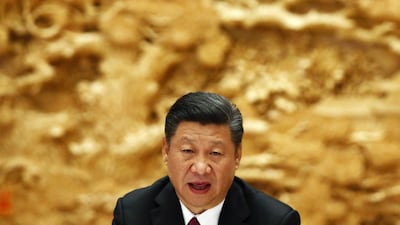Donald Trump is about to embark on one of the most challenging tests of statecraft in his young presidency. Early next month, he will travel to Asia where he will meet leaders of traditional American allies such as Japan and the Philippines, as well as new partners, such as Vietnam.
Mr Trump has much to prove to these countries. Former president Barack Obama's famous "pivot to Asia" resulted in fresh engagement between the US and Asia primarily designed to offset China's growing influence. Mr Obama appointed an ambassador to the Association of Southeast Asian Nations, opened a new chapter in US-Vietnamese relations and helped design the Trans-Pacific Partnership Agreement to counterbalance Chinese economic influence in the region and beyond. One of Mr Trump's first acts in office, famously, was to remove the US from the TPP, effectively handing China the geoeconomic upper hand that Mr Obama sought to keep in check.
As such, the most watched part of this marathon trip will take place in China, where Mr Trump will attempt to broker some sort of solution to the continued crisis in North Korea and combat China's increasingly aggressive foreign policy. Lost in the rhetoric of impending war with North Korea is how the US plans to respond to China's booming economic footprint across Asia and beyond. Specifically, how does Mr Trump intend to address China's Belt and Road initiative now that the programme is touching on traditional US allies far beyond Asia's borders?
_______________
Read more from Opinion
What the Tillerson-Trump tensions mean for the Middle East
The ambition for a nuclear-free Earth must not blind us to reality
Why has there been such an increase in potentially fatal allergies?
_______________
Through the initiative, China is creating a new global economic reality in which all roads lead to Beijing. The project has begun with massive infrastructure investment designed to connect the Chinese market to Europe and create a new maritime trade network throughout the Indian Ocean. Quite literally, China is building its ideal economic reality through construction and capital.
The relationship between Belt and Road and the Gulf Co-operation Council is one clear example of how the project could change not just global economics but also geopolitics. In a report that will be published this week on the opportunities and challenges for the GCC in the initiative, the emerge85 Lab detailed various outcomes of China's rising influence in the Middle East. Both the GCC and China stand to benefit enormously from a deeper partnership.
Building on already strong relations, China would have a guaranteed source of energy by extending the initiative into the Arabian Peninsula. As we have found, the GCC's central location, aviation and port infrastructure, and strong bilateral relations with China make it attractive to Chinese politicians. Moreover, the GCC has strong relations with Pakistan, which is a key Belt and Road partner, much to India's chagrin.
From a GCC perspective, as the report lays out, the initiative could be a driving force behind regional energy integration, including gas pipelines, electricity transmission and strategic energy security initiatives such as storage facilities. A stronger economic partnership with China could also offset Iranian influence in the Belt and Road and further strengthen Egypt's economy, given the importance of the Suez Canal in global trade. The Qatar crisis notwithstanding, the GCC stands to benefit enormously from a united bargaining position with the rising economies of the world.
_______________
Read more on Belt and Road
The geopolitics of the Middle East will never be the same again
Explainer: What is Belt and Road?
‘Belt and Road’ is a bridge to our common future
_______________
When Mr Trump arrives in Beijing, he will probably not be thinking about China's energy security needs and the GCC. Given the speed at which China is raising capital and investing in infrastructure to make the initiative a reality, this should be a matter of concern.
This boils down to a question of leadership. Previous US presidents appeared to understand the intention, if not the exact design, of China's economic ambitions. In turn, they took steps to firm up traditional alliances and foster new allies in an effort to ensure the power of America's global footprint. Mr Trump's decision to effectively rip up the TPP, coupled with his aggressive message of protectionism, has done much to tarnish America's leadership image just as China spreads its wings through the initiative.
The countries of the GCC are among America’s core allies, through whom US foreign policy in the Middle East and beyond is shaped. That is why the emerging GCC-China axis, facilitated through the initiative, is critical to the overall debate about China’s growing economic and political leadership role. As the US retreats behind bombastic protectionist rhetoric, China is offering access to a new global marketplace. Trade is increasingly defined between emerging markets and not simply from emerging markets to developed ones. Deeper trade between the GCC and China is one of many examples of this new economic reality.
While energy concerns attract the Chinese to the GCC, both in terms of the initiative and bilateral relations, these concerns are not permanent. With advances in technology and oil reserves increasing by the month, energy will not always define the relationship. As such, the GCC should use energy to attract China now to ensure it becomes a long-term partner through other aspects of trade, such as infrastructure development and technological advancements.
This transforming economic relationship is one part of the backdrop to Mr Trump's Asia trip. While the headlines are focused on North Korea, it is critical not to lose sight of the long-term issues at play.
Joseph Dana is the editor-in-chief of emerge85 Lab, a project exploring change in the emerging world and its global impact

